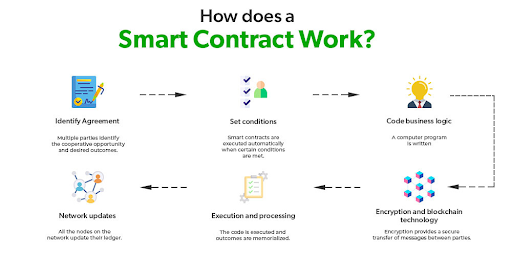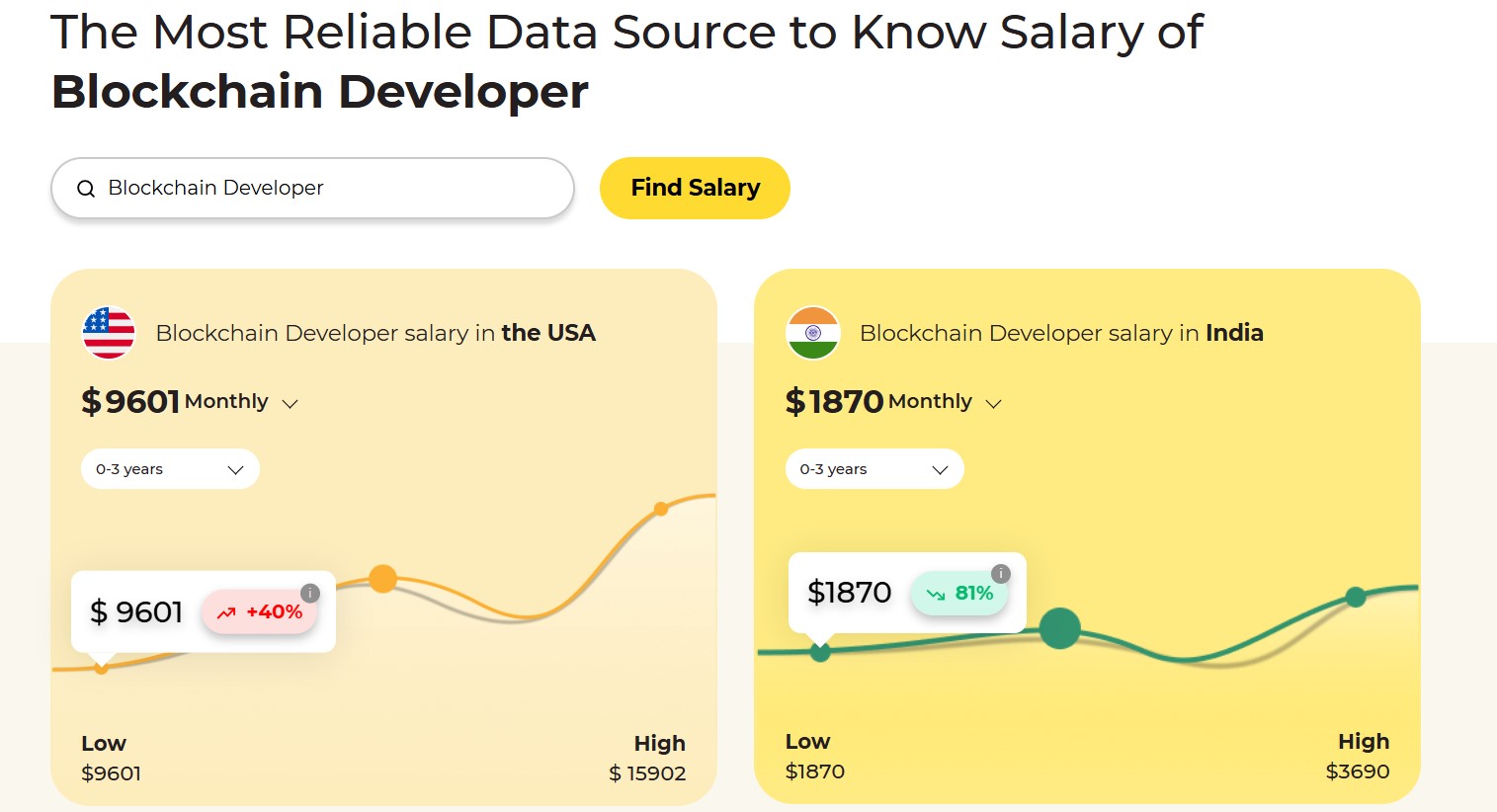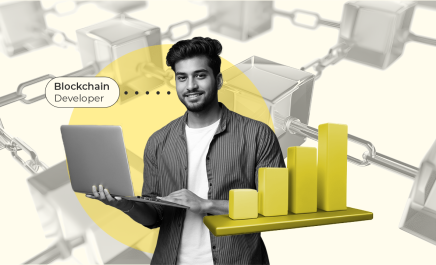Smart Contracts to DeFi: Why Hiring Blockchain Developers Is Essential for Your Business
- Shachi Dixit
- March 27, 2025
- 5 Minute Read

Blockchain is a decentralized, distributed ledger system which facilitates secure and transparent transactions without intermediaries. Blockchain functions on a network of nodes that authenticate and store data, making it immune to fraud. Blockchain is applied to finance, healthcare, supply chain, governance and cryptocurrencies.
Firms should hire blockchain developers to build, optimize, and secure their platforms. Individuals with blockchain developer skills can prevent inefficiencies, security vulnerabilities, and missed opportunities in this competitive space.
Let’s explore blockchain developer roles, why hiring them is the smartest move for your business, and the cost of hiring blockchain developers.
Understanding Smart Contracts
A smart contract is a self-executing digital contract where the rules of the agreement are written directly into a code. It enforces automatically without the need for intermediaries.
Features
- All contract terms and actions are visible on the blockchain.
- Once deployed, smart contracts cannot be modified, and this ensures security.
How Smart Contracts Function?

- The smart contract is written in code and deployed onto a blockchain.
- The contract executes the action automatically when predefined conditions are met.
- Blockchain nodes validate and record the transaction.
Industry Use Cases
Finance |
|
| Supply Chain |
|
Real Estate |
|
| Healthcare |
|
Governance |
|
Benefits for Businesses
- Cost reduction
- Speed
- Efficiency
- Security
- Accuracy
The Rise of Decentralized Finance (DeFi)
DeFi is a new blockchain-based peer-to-peer financial system that allows individuals and businesses to trade amongst themselves without third parties.
Key DeFi Applications
With over 5 million unique wallets and $ 47 billion total value locked, DeFi is set to revolutionise everything from banking to investing.
Here are the top DeFi applications.
- Decentralized Exchanges
- Lending and Borrowing
- Stable Coins
- Yield Farming
- Decentralized Insurance and autonomous organisations
- Non-Fungible Tokens
Role of Smart Contracts in DeFi
Smart contracts in DeFi allow
- users to lend, trade or borrow assets without traditional order books
- users to stake their assets in various avenues
Why is DeFi Replacing Traditional Finance?
- DeFi offers banking services to anyone with an internet connection and a digital wallet.
- By eliminating intermediaries and automating processes, DeFi is faster than traditional finance transactions.
- Transaction fees on DeFi sites are lower than banks.
- It commands a high level of trust and transparency.
Why Businesses Need Blockchain Developers?
The demand for blockchain professionals has created numerous career opportunities for those with the right skills.
The Increasing Demand for Blockchain Skills
- Blockchain is applied across industries, leading to a high demand for qualified developers.
- Skilled blockchain developers are not plenty.
Hiring Blockchain Developers- Benefits
- A blockchain developer is a software developer proficient in building blockchain applications.
- Hiring a blockchain developer ensures that a professional designs and deploys the technology.
Blockchain Developer Roles
Blockchain developers fall into two main categories.
Core Blockchain Developer | Blockchain Software Developer |
|
|
Security and Compliance in Blockchain Projects
- General Data Protection Regulation (GDPR) to safeguard personal information.
- Know your customer (KYC) and anti-money laundering regulations.
Blockchain security is based on decentralization and cryptography.
- Decentralization reduces single points of failure by distributing information and control over a network of nodes.
- For data integrity and user authenticity, the cryptography layer uses cryptographic algorithms.
Key Blockchain Developer Skills
While hiring blockchain developers, ensure the individuals possess the following skills.
Blockchain Programming Languages |
|
| Blockchain Frameworks |
|
Cryptography and Security Principles |
|
| DeFi Protocols and Tokenomics |
|
How to Hire the Right Blockchain Developers?
In-house Blockchain Development
Here are the pros and cons of recruiting an in-house developer.
Pros | Cons |
|
|
Outsourcing Blockchain Development – Benefits
Outsourcing blockchain development can be used to implement blockchain technology without an in-house team.
- The cost of hiring blockchain developers is lower.
- Companies save on infrastructure and software licenses
- Experienced teams, reducing the time taken to onboard and train developers.
- Companies can focus on their core businesses while experts manage the technical intricacies.
- Organizations can scale up or down depending on projects.
- Blockchain firms are well versed with the latest technologies such as Layer 2 solutions, smart contract security, and interoperability.
Sourcing Blockchain Developers
You can source individuals for blockchain developer roles through
- Professional networks like LinkedIn
- Freelance marketplaces like Upwork
- Developer Communities like GitHub
- Blockchain-specific platforms
Cost of Hiring Blockchain Developers
The cost of hiring blockchain developers is between $1870-3690/month but can increase with increasing demand.

Challenges in Blockchain Development
Blockchain development presents numerous challenges, including scalability, security, and the complexity of maintaining decentralized systems. These obstacles require innovative solutions to ensure efficiency, reliability, and wide-scale adoption.
Security Risks in Smart Contracts
Smart contracts also have loopholes that hackers exploit to steal funds or manipulate transactions.
Scalability
Blockchain networks are slow since they involve a lot of computations to authenticate transactions, so scalability is an issue.
Compliance Challenges
Various blockchain platforms with protocols and standards result in legal ambiguity.
Rapid Technological Advancements
Businesses must constantly sync with new technologies like Layer 2 solutions and AI integration.
Future Trends in Blockchain and DeFi
The blockchain and DeFi industry is evolving, propelling businesses globally.
Smart Contracts- Emerging Trends
- AI-based and cross-chain smart contracts
- Upgradable smart contracts that use a proxy for modification
- Advanced mathematical models ensure bug-free and secure smart contracts
- Zero-knowledge proofs for enhanced privacy
Impact of DeFi on Business
- Tokenization of real-world assets such as real estate, stocks, and commodities, allowing fractional ownership and improved liquidity.
- Decentralized insurance products for affordable risk management solutions.
- Enables cross-chain business collaboration to access data from diverse, decentralized applications.
- Seamless, low-cost decentralized exchanges provide security and control over trading.
Integration of AI and Blockchain
The convergence of AI and blockchain will
- Lead to autonomous financial systems
- Enhance cross-platform interoperability
- Improving overall financial inclusivity
Blockchain Predictions for the Future
- DeFi will enable financial access for unbanked populations.
- Tokenization of assets like real estate, stocks, and commodities for easier investment
- DeFi will merge with conventional financial systems.
- To combat scalability issues, Layer 2 solutions will be widely adopted.
Conclusion
DeFi has revolutionized businesses by enabling transparent, secure, automated financial services without third parties.
In a bid to benefit from this ever-evolving landscape, there is a need for hiring blockchain developers. A blockchain developer’s skills ensure proper implementation of blockchain-based solutions.
A blockchain developer’s role is to ensure that businesses create secure, scalable, and innovative solutions when addressing the challenges of decentralized systems. By investing in the right blockchain developers, organizations can be at the forefront of the digital economy.
Frequently Asked Questions
1. What is the role of blockchain developers in DeFi projects?
Ans: Blockchain developer roles are to create, build, and maintain decentralized finance applications on blockchain platforms.
2. What are the most widely used blockchain development platforms?
Ans: Ethereum for smart contracts and Solana for high-speed performance.
3. What are the problems in deploying DeFi solutions?
Ans: DeFi poses security risks, is scalable, has regulatory ambiguity, and is not suitable for people with lesser technical knowledge.
4. How are smart contracts different from regular contracts?
Ans: Smart contracts are coded into and automatically executed without the necessity of third-party intervention.
5. What industries make use of blockchain technology?
Ans: Industries such as finance, supply chain, health care, oil and gas, and gaming have adopted blockchain technology.

Thank you for submitting the details!
We will keep your information safe. Feel free to contact us with any questions at hello@uplers.com
Please check your email for next steps shared by Robert.















